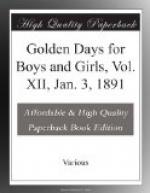Ichabod, slowly and painfully, rose to his feet.
“I was calc’lating to git up. Didn’t I say to ye I was? Didn’t I say I was goin’ to git up soon as ever I could? And what fer did I say? Why, I was goin’ to ask a favor o’ Mr. Doolittle—jest a leetle favor.”
“Oh!” said Trudy, remembering.
She had forgotten the old man’s queer talk about the box in the closet, and the papers in the box, and his odd eagerness concerning them.
“Seein’ you—” continued the old man. “Well, I couldn’t stan’ it another minute arter that. I jest got up. I was kind o’ weak in my legs to the fust, but I got thar. I got to Mr. Doolittle’s office, and thar he was settin’. He knows me, Mr. Doolittle does, and I wan’t afraid to ask that leetle favor of him.”
Ichabod had got back his breath and his composure now. He covered his bald head with his hat, planted himself against the fence, his little, twinkling eyes fixed on Trudy with an intense gaze, and continued his story:
“Thar he set. And I walked in and I says to him, ‘Air ye willin’ to do sump’n fer me, Mr. Doolittle?’ And says he, ‘Yes I be, Ichabod.’ And says I, ‘It ain’t goin’ to take but jest a minute, Mr. Doolittle.’ And says he, ‘Go ahead, Ichabod.’
“Says I, ‘I was lookin’ in the closet of the garret bed-room up to Mrs. Spencer’s house, whar I’ve been stayin’, and I found a leetle box, shoved ‘way back, as though it wan’t no use, anyhow. And, kind o’ hankerin’ to know what ’twas, I broke it open. And thar was papers in it,’ says I— ’and letters.
“‘I can’t read none myself,’ says I— ’only jest a leetle; but I looked over them letters, and I worked and I figured, and I studied out a leetle here and a leetle thar, till I begun to suspicion sump’n. Sump’n awful quare—awful quare! And this here one,’ says I, ’I’ve fetched down to ye, fer ye to jest look at. And if there ain’t nothin’ in it,’ says I, ’why, all right, and thank ye fer yer trouble. And if thar is sump’n—’ says I.
“And I handed him over that thar ole letter, and then I set still, and I had my ole eyes glued right onto his face, and I ketched my breath and I waited.
“‘Well, I’ll see, Ichabod,’ says he. ’Ole letters are quare things, Ichabod,’ says he; ‘but I’ll look at it.’
“And he looked. He looked it up and down two er three times, and then he read it clean through two er three times more. And then he took up his spectacles off’n the table, and he read it ag’in, and he looked jest as astonished as if he’d seen a ghost.
“Says he, ’I can’t make it out. Reuben Wallace has been dead a year, and this is the fust breath o’ evidence that he left any money, although everybody in this town has been clean up a stump about his not leavin’ any. But this letter—dated two months afore he died,’ says he, ’is from a coal merchant in New York, findin’ that in the printin’ up top o’ the letter. And it makes reference to the sum o’ forty thousand dollars invested by Reuben Wallace in his business. There’s more in it,’ says he; ‘but that’s the principal thing.’




